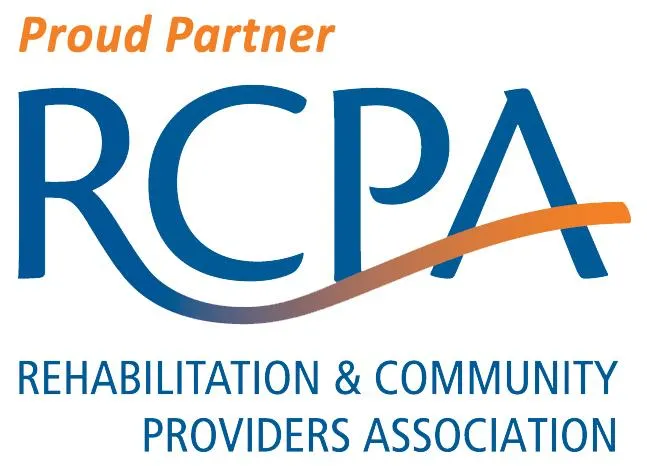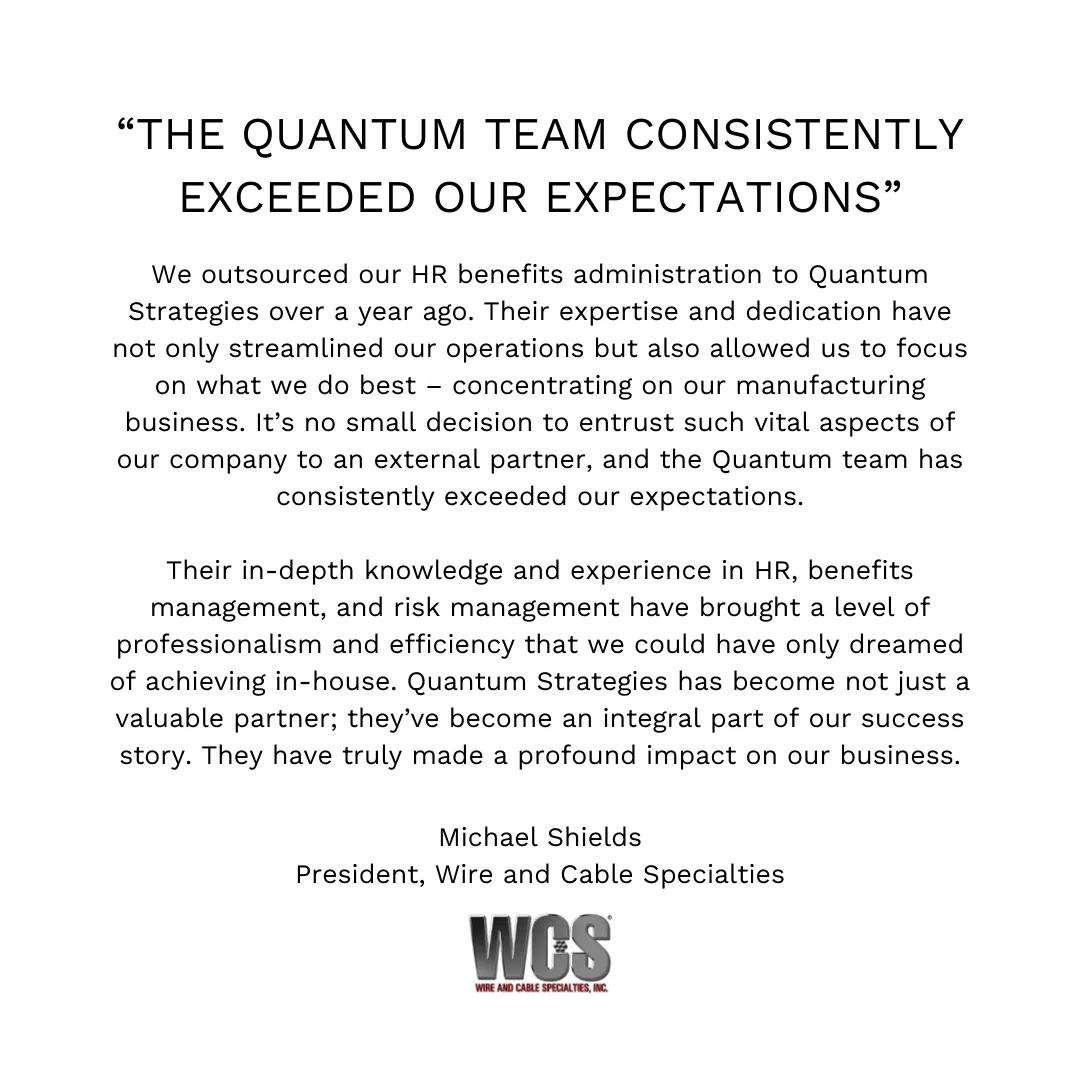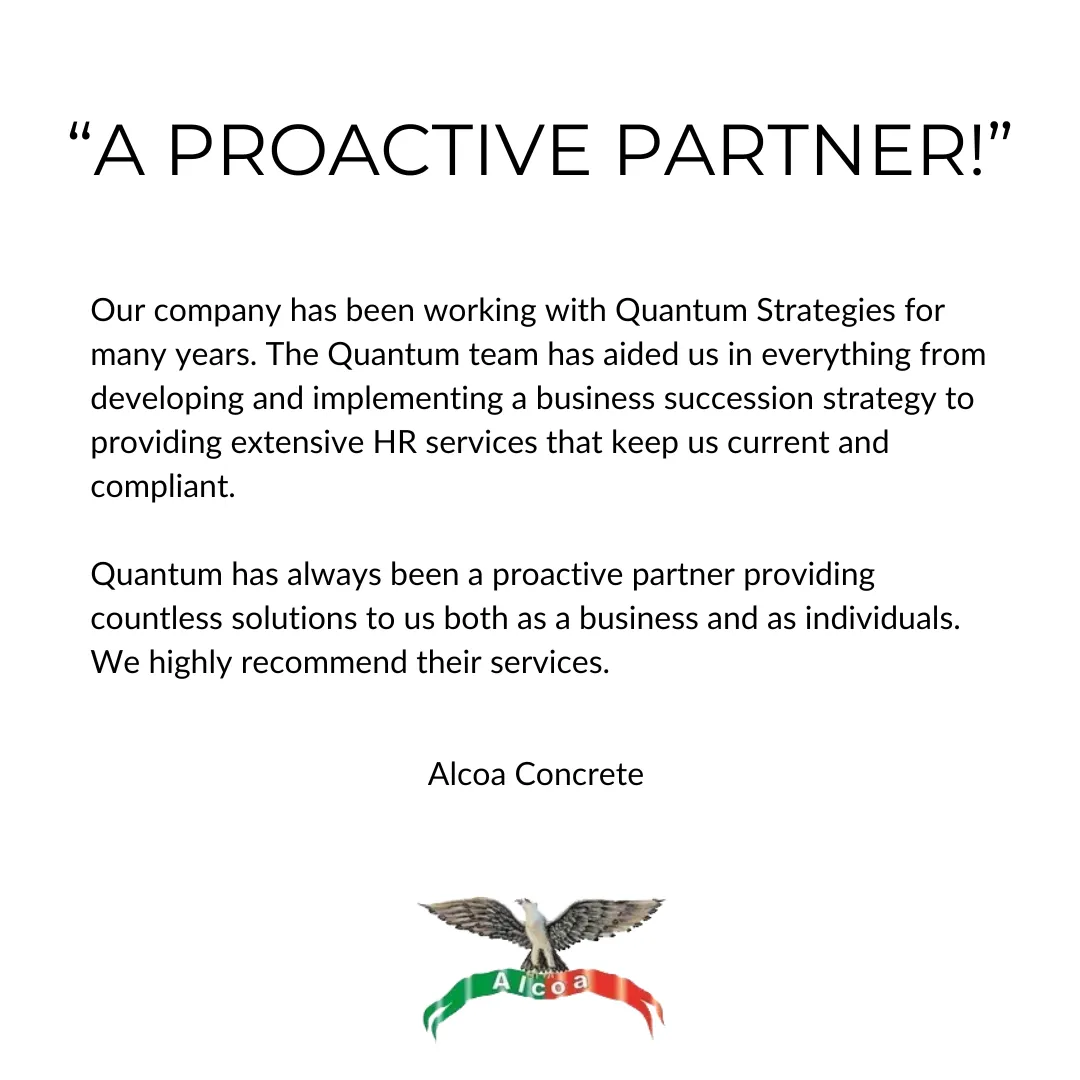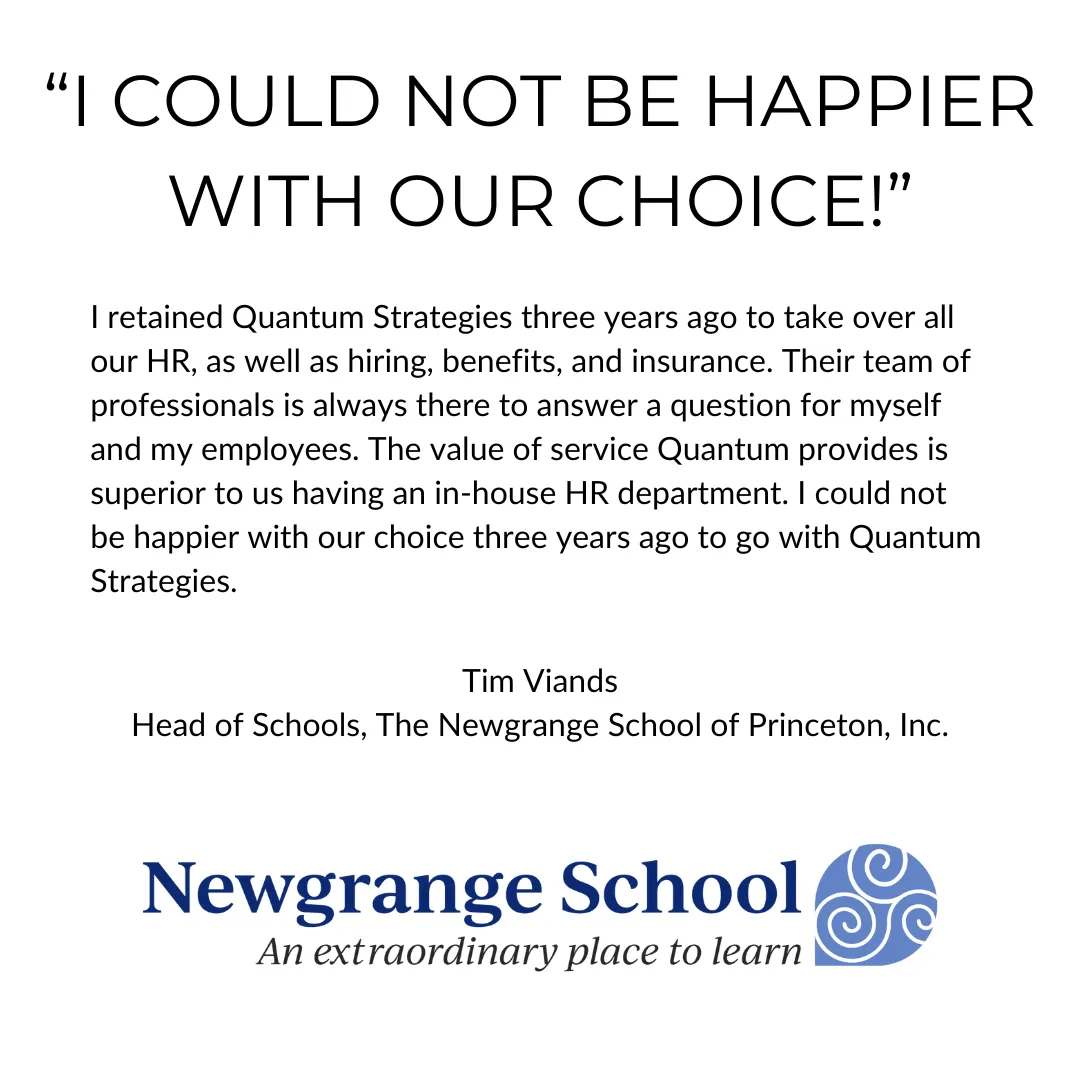Tailored HR Solutions as Unique as Your Business
Expert consulting and service to elevate your HR from a headache to a value driver.
Does Your HR Function Make the Grade?
Take our 5-minute quiz and evaluate the effectiveness of your HR function.

How We Help
We Focus on Your HR Needs,
So You Can Focus on Your Mission.
At Quantum Strategies, we understand that effective human resource management is the cornerstone of every successful business, regardless of size. Our mission is to provide tailored HR solutions that align perfectly with your unique business needs and growth stage.
Our Services
Navigating Change with Confidence: Quantum Expert HR Solutions
From Policy Assistance to Leadership Succession Planning, Quantum Strategies is Your Ultimate HR Resource to Solve Your Business Challenges.
HR Operational
Assessments
Unlock the full potential of your HR department. Our collaborative approach brings clarity and efficiency to your HR operations, providing a thorough analysis of your department's structure, costs, effectiveness, and needs.
Comprehensive Analysis: Detailed evaluation of your organization, workgroups, and individual roles for optimized efficiency.
Objective Insights: Receive a clear blueprint highlighting your HR department's strengths, weaknesses, and gaps.
Strategic Recommendations: Actionable plans focusing on technology utilization, communication enhancement, and leveraging department strengths.
HR Consulting and Managed Services
Tailored to align with your unique needs, our HR consulting and managed services enhance operational efficiency and effectiveness, allowing you to focus on your core mission while we optimize your HR investment.
Expert Supplemental Support: Strengthen your existing HR team with specialized expertise to navigate complex HR landscapes.
Personalized, Agile Solutions: Customized services for organizations with or without HR teams, adaptable to your specific requirements.
Goal-Oriented, Clear Communication: Delivering precise, actionable strategies that align with your organization’s goals and ensure successful execution.
Custom HRIS Design and Integration
Revolutionize your HR data management. Our team will evaluate your current human resources technology stack, offer recommendations, and then integrate your new and existing systems with our cutting-edge technology, ensuring seamless data flow and optimized operational efficiency.
Seamless Integration: Connect legacy systems with modern platforms for streamlined data management.
Tailored Design: Custom HRIS solutions uniquely crafted to meet your specific business needs.
Advanced Analytics: Leverage data-driven insights for strategic decision-making and operational excellence.
“Successfully steering through the specialized HR challenges within organizations of all kinds demands expert understanding, strategic planning, and precise implementation. With comprehensive knowledge of these challenges and the right solutions, your business can stay focused and successful in their vital missions.”
William J. Rizzo

Who we Are.
We Focus on Your HR Needs,
So You Can Focus on Your Mission.
At Quantum Strategies, we recognize that proficient management of human resources is fundamental to the success of any enterprise, irrespective of its scale. Our objective is to deliver customized human resource solutions that are in perfect harmony with your distinct business requirements and developmental phase.
Constant Improvement
Commitment to Customers
High Level Of Knowledge
Best Service You Can Get



Why Choose Us
A True Partner to Solve Your Most Complex HR Challenges.
Empowering HR Innovation and Compliance
Commitment to 100% Client Satisfaction
People-First Approach

Peace of Mind:
Handle ongoing compliance with ease

Employee Satisfaction:
Build a positive workplace with engaged employees

Strategic Confidence:
Drive strategy with advanced analytics

Leadership Development:
Equip your team with the tools to lead

2,245 +
Happy Clients

25 +
Years Of Experience

120 +
Professional Team
Testimonials
The Quantum Commitment - 100% CLIENT SATISFACTION!
At Quantum, we understand that your satisfaction matters most, and The Quantum Commitment is our way of putting that understanding into action. Experience the difference with a team that is dedicated to making your satisfaction the cornerstone of our service. Because when you choose Quantum, you choose excellence, reliability, and a commitment to exceeding your expectations every time.
Our Resources
Unveiling Proven Strategies and Insights.
Discover actionable tips, expert advice, and industry insights to fuel your journey towards success.

Fostering a Psychologically Safe Workspace
As we navigate the complexities of the post-pandemic world, the importance of mental health in the workplace has surged to unprecedented levels. According to research from the
American Psychological Association, 81% of employees are now actively seeking workplaces prioritizing mental well-being.
Key Challenges Faced by Human Resources in Nonprofit Organizations
The nonprofit sector brings its own set of specialized difficulties, especially in the area of human resources (HR). Although these difficulties may share some common ground with those in the for-profit industry, they possess unique characteristics that require special attention from nonprofit leaders.
FOUND THESE HELPFUL?
Explore Additional Articles and Resources In Our Blog

Boost HR Efficiency with a Self-Service Employee Knowledge Base
In today's hectic workplace, employees want rapid information access about payroll, benefits, or company policies. Relying only on HR for responses might irritate staff, raise bureaucratic workload, and slow output— all of which undermine HR efficiency. That's where a self-service knowledge base comes into play.
Thanks to a structured knowledge base, employees can find answers on their own, lowering HR questions, improving HR efficiency, and raising productivity. This manual will discuss the need for employee self-service, the main elements of a good knowledge base, and step-by-step approaches for setting one up so that your staff is informed, empowered, and engaged.
Why Employee Self-Service Matters
Modern work depends so much on efficiency that human resources teams continually look for ways to streamline procedures and give their staff members power. One of the most efficient answers is a well-arranged employee self-service knowledge base. It allows employees to access essential information and tools on their own, without needing to go through HR for every request.
Employee self-service creates a centralized place for information, making it easier to manage and maintain. It supports smoother communication and ensures that everyone has access to the same resources when they need them.
This approach also helps organizations stay organized as they grow. With more people and more moving parts, having a clear and consistent system in place helps maintain structure and order.
Employee self-service is not just a convenience—it’s a modern necessity.

The Shift Toward Workplace Autonomy
Efficiency is essential in the modern workplace. Therefore, human resources departments always look for means to streamline processes while empowering their staff members. A properly organized employee self-service knowledge base is among the most efficient remedies.
Employee Self-Service Benefits
Developing an employee self-service knowledge base yields significant advantages, including:
Reduced Administrative Tasks: Human Resources teams may focus on significant activities by dedicating less time to answering often-asked questions.
Faster Issue Resolution: Employees get instant responses rather than waiting for email responses or planned meetings.
Improved Employee Satisfaction: An effective self-service system provides a more direct and pleasurable experience devoid of annoyance.
Enhanced HR Efficiency: Reduced pressure on HR staff leads to better support for more complex workplace needs
Industry Statistics
Studies show that to emphasize the need for self-service knowledge bases:
Companies with effective employee self-service portals might reduce HR queries by up to 40%.
Over 75% of workers would prefer to look for answers independently rather than contact HR immediately.
Businesses that put resources toward structured knowledge systems have greater employee engagement and productivity rates.
According to Deloitte, a global HR transformation initiative generated over 35,000 self-service cases, significantly reducing direct HR inquiries.
Organizations encourage independence in the workplace and boost general productivity by creating a self-service system grounded on a knowledge base. As a result of this fundamental shift, self-service becomes a necessary tactic in today's quickly shifting corporate terrain.
Key Components of an Effective Knowledge Base
The arrangement and simplicity of a self-service knowledge base determines its success. The tool loses its efficacy if workers struggle to find answers quickly. The following are the essential components every HR knowledge base should have:
1. Simple Navigation Using Organized Classification
Employees must be able to find information quickly. Clear categories such as Benefits and Payroll, Workplace Policies, IT Support, and Onboarding help simplify the knowledge base's navigation. Organized systems improve output and help lower irritation.
2. Searching power for fast results
For self-service, a good search bar is essential. Workers should be able to quickly access relevant papers by entering keywords. Good ways to improve searching include:
Use relevant keywords for easy accessibility and mark content.
Leveraging AI-driven recommendations that expect questions and provide pertinent articles.
Encouragement of mobile access to enable workers to search on the go.
3. A Frequently Asked Questions (FAQ) Section to Respond to Common Inquiries
Addressing frequent employee queries requires an FAQ area, which is a critical element. This section should cover commonly asked human resources issues like vacation policies, salary issues, benefits enrollment, and remote work guidelines to reduce the need for direct HR involvement in answering regular queries.
4. Step-by-Step Guides & Tutorials
Requesting time off, changing their personal information, or registering for advantages. Providing organized, simple-to-follow instructions, including screenshots or short how-to videos, enhances understanding and simplifies troubleshooting.
5. Interactive Features to Raise Engagement
An active knowledge base is more than just set articles; chatbots, feedback tools, and AI-driven navigation may enhance users' enjoyment.
Chatbots provide employees with quick responses to often-asked questions.
Assessment tools help Human Resources teams evaluate article success and refine content.
Automated updates guarantee that policies remain up to date without continuous human effort.
Combining these fundamental parts will help companies transform their knowledge base into an employee-friendly, simple-to-use, efficient self-service asset that improves HR productivity and encourages workplace independence.

How to Build a Knowledge Base: Step-by-Step
Creating a self-service knowledge base requires more than just data collection; it requires careful preparation to ensure that it is pertinent, accessible, and valuable. Follow these basic principles to build a system that staff members will use.
1. Review of Employee Needs
Before creating any material, the employee needs to be determined based on a knowledge base. Start with:
Going back through past support tickets to look for often-asked questions.
Collaborating with department heads to pinpoint staff knowledge gaps.
2. Arrange and Collect Information
A well-functioning knowledge base needs well-organized, straightforward material. When arranging articles:
Use simple and direct language; stay away from jargon.
Arrange related topics together for simple navigation.
Break down complex processes into simple, step-by-step instructions that are easy to follow.
3. Select the Right Platform
Not every knowledge base is equal; choose the best software to meet your company's needs. Consider:
HR-centric systems with pre-created templates for employees are frequently asked questions and policies.
Cloud-based systems that ensure availability from any location.
AI-driven, fast, and user-friendly search tools
4. Optimize for Accessibility
A knowledge base must be readily available and user-friendly. Suggested guidelines comprise:
A design fit for mobile devices helps workers while they are not at their computers.
Navigational design is user-friendly with distinct categories and search capabilities.
Support for several languages in several professional settings.
5. Guarantee frequent update distribution
An unchanging knowledge base loses reliability and maintains its relevance by:
Creating a review and amendment schedule for existing policies.
Using staff input to enhance articles.
Using automation technologies for updates
By following these steps, HR departments can produce an accessible and efficient knowledge base that lowers administrative chores and benefits staff members.
Challenges & How to Overcome Them
The most carefully considered knowledge base may have obstacles as well. To ensure success, HR departments must actively find potential problems and hone their policies. Typical issues and practical strategies to solve them are provided below:
1. Outdated Material
If the information is not often updated, employees may start to depend on asking HR questions directly, therefore losing confidence in the knowledge base. Set regular content reviews so that HR can update policies every three months to guarantee their currency and accuracy.
2. Low staff involvement
It has no value if employees cannot properly find their way through or access a knowledge base. Encourage adoption through internal awareness initiatives.
Improve the search tool so consumers can rapidly find the data they need.
Gather staff feedback to spot holes and improve usability.
3. Poor organization & Accessibility
Employees' inability to swiftly find information causes abandoned searches.
Tags and filters help to refine search results.
Make sure it works with mobile devices so workers can access information everywhere.
4. Without maintenance or ownership
Knowledge bases can get clogged with unnecessary or duplicate information without clear ownership of the content.
5. Hesitation to Change
Staff could be unwilling to embrace self-service technologies because of their deep reliance on HR staff.
Provide self-service, benefit-emphasizing courses.
Promote adoption by means of employee recognition programs.
Tackling these problems directly will help HR departments improve the efficacy and utility of their knowledge base, creating a priceless and self-sustaining asset for the company.
Measuring Success: Metrics to Track
Establishing an employee self-service knowledge base is revolutionary, yet its success hinges on tracking key performance indicators. Understanding how employees engage with the platform helps HR departments to optimize its impact and enhance the system.
1. Use and Interaction Rates
Employees frequently use an efficient knowledge base. Among the most important indices are:
Visit frequency: The frequency with which staff members consult the knowledge base.
Session duration: Longer sessions suggest that employees are utterly engaged in the content.
Queries for search assist HR in enhancing information placement by helping to find popular search terms.
2. Resolution Rates
A self-service knowledge base mainly aims to answer staff questions without requiring HR involvement.
The efficacy of the resolution is evaluated using the next criteria:
The percentage of HR inquiries dropped; fewer employee direct questions indicate a functioning system.
The frequency with which FAQs provide solutions should be tracked to determine their value.
3. Satisfaction and Feedback Scores
Staff members should feel emboldened rather than disheartening when using the knowledge base. Direct input helps HR departments to identify problem areas more effectively.
Employee satisfaction surveys help you to see if the knowledge base meets user needs.
Provide employees with the capacity to assess the relevance of the material and provide recommendations for modifications to ratings and comments for articles.
4. Search Efficiency and Navigational Efficacy
Monitoring how quickly employees can get answers reveals the organization of the content. Watch for:
The proportion of users who get results with only one search determines the rate of successful searches.
Navigation drop-off points are places where employees give up their search in frustration.
HR divisions can make certain their self-service knowledge base stays useful, available, and always improve at meeting the requirements of their employees by monitoring these vital KPIs.
Summary
A well-organized employee self-service knowledge base improves HR efficiency by reducing repeated questions and giving employees the capacity to independently seek out important information. Focusing on clear classification, better search capabilities, FAQs, step-by-step instructions, and interesting elements, companies may simplify processes and increase employee freedom.
For a knowledge base to be effective, employee involvement, regular updates, and effective monitoring of key performance indicators are all vital. Tracking resolution success, usage rates, and comments helps HR departments to improve content and guarantee the platform stays helpful over time.
Using a self-service strategy based on a knowledge base, businesses increase employee happiness, boost productivity, and let HR departments focus on strategic initiatives instead of routine questions.
Ready to streamline HR processes and empower your employees with instant access to information? Contact us today to explore how our Employee Engagement Centre (EEC) can help you implement a knowledge base that enhances efficiency, improves workplace autonomy, and transforms your HR strategy.
Connect
Keep Up with Our Latest News and Insights
Subscribe to Quantum Strategies' latest updates and insights.
Office: Philadelphia, PA | Glen Mills, PA | Washington, DC
Call 610.624.1770
Email: info@QS2500.com
Site: www.QS2500.com






